Free Range Chickens are a great way to produce your own healthy eggs. If you’ve ever dreamed of watching chickens happily scratching in the dirt, you might be thinking about raising free-range chickens. But before you go running wild with visions of fluffy chicks and fresh eggs, let’s talk about what exactly free-range chickens are and how you can raise them like a pro.
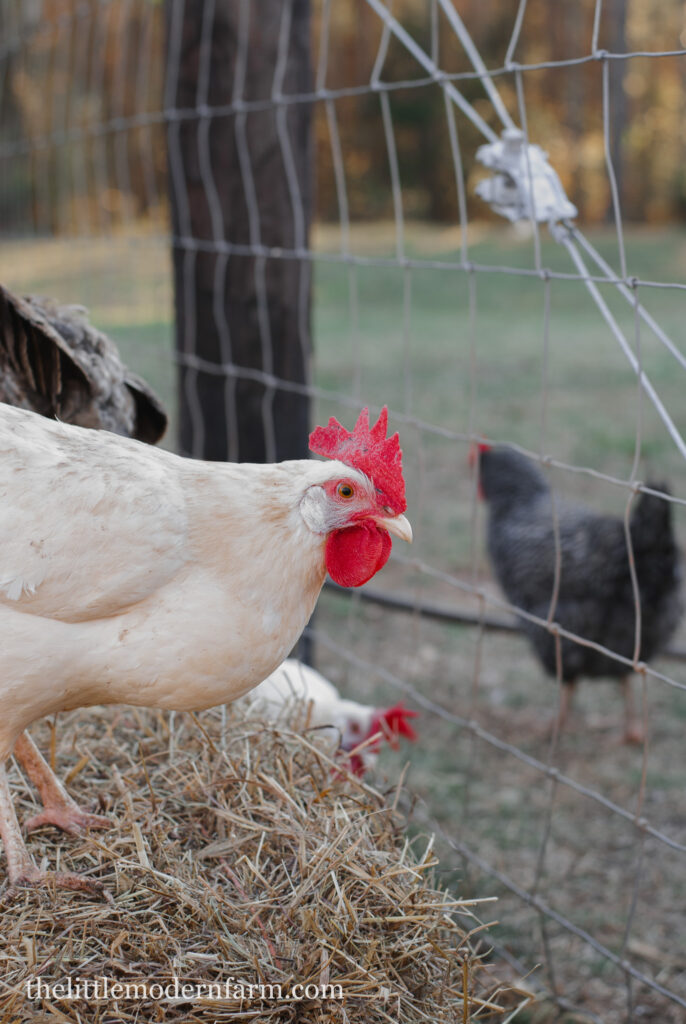
Raising Free Range Chickens
Ever wondered what it truly means for chickens to roam free, pecking and scratching to their heart’s content? Well, wonder no more! I’m going to explain what they are, how to raise them, and why they might just be right for you.
So, what’s the deal with free-range chickens anyway? Picture this: a sunny meadow, a group of happy hens pecking away at bugs, with plenty of space to roam. That’s the dream of free-range chicken farming. Unlike their confined counterparts, free-range chickens have the freedom to explore, forage, and lead a more natural lifestyle.
According to USDA regulations, for poultry to be labeled as “free-range” or “free-roaming,” the birds must have access to the outdoors for at least part of the day. However, the specific requirements regarding the duration, quality, and size of outdoor access may vary.
For example, the USDA’s standards for free-range poultry state that the birds must have continuous access to the outdoors for at least 51% of their lives. Additionally, the outdoor area must be comprised of vegetation or soil suitable for foraging and be located within 50 feet of the housing facility.
You should be aware that while “free-range” labeling implies certain outdoor access for poultry, the actual conditions and quality of outdoor space can vary significantly. Therefore, it’s always a good idea to research and choose products from producers who prioritize animal welfare and environmental sustainability.
But here’s the kicker: raising free-range chickens isn’t just about letting them loose in your backyard and hoping for the best. There’s a bit of strategy involved to ensure your feathered friends stay happy, healthy, and productive. Let’s break it down, shall we?
What You’ll Need
1. Coop and Run Setup: First things first, every free-range chicken needs a cozy coop to roost in at night. Your coop should provide ample space for each chicken to perch comfortably and lay eggs in nesting boxes. Make sure it’s predator-proof and fenced to keep your flock safe from curious critters. A chicken tractor is also great for housing chickens. It’s easy to move, providing them with a safe and clean environment.
2. Plenty of Space: Free-range chickens thrive in space. The more room they have to roam and explore, the happier they’ll be. Trust me, they’ll thank you for it with plenty of delicious eggs!
3. Nutritious Diet: While free-range chickens love to forage for bugs and plants, they still need a balanced diet to stay healthy. Make sure to provide them with high-quality chicken feed supplemented with fresh fruits, vegetables, and grit for digestion. Oh, and don’t forget the occasional treat like mealworms or kitchen scraps—they’ll love you for it!
4. Protection from Predators: Living free-range comes with its fair share of risks, including hungry predators looking for an easy meal. Invest in sturdy fencing, predator-proof locks on your coop, and even motion-activated lights or alarms to deter unwelcome visitors.
5. Regular Health Checks: Just like any other pet or livestock, free-range chickens need regular health checks to stay in tip-top shape. Keep an eye out for signs of illness or injury, and be proactive about treating any issues that arise.
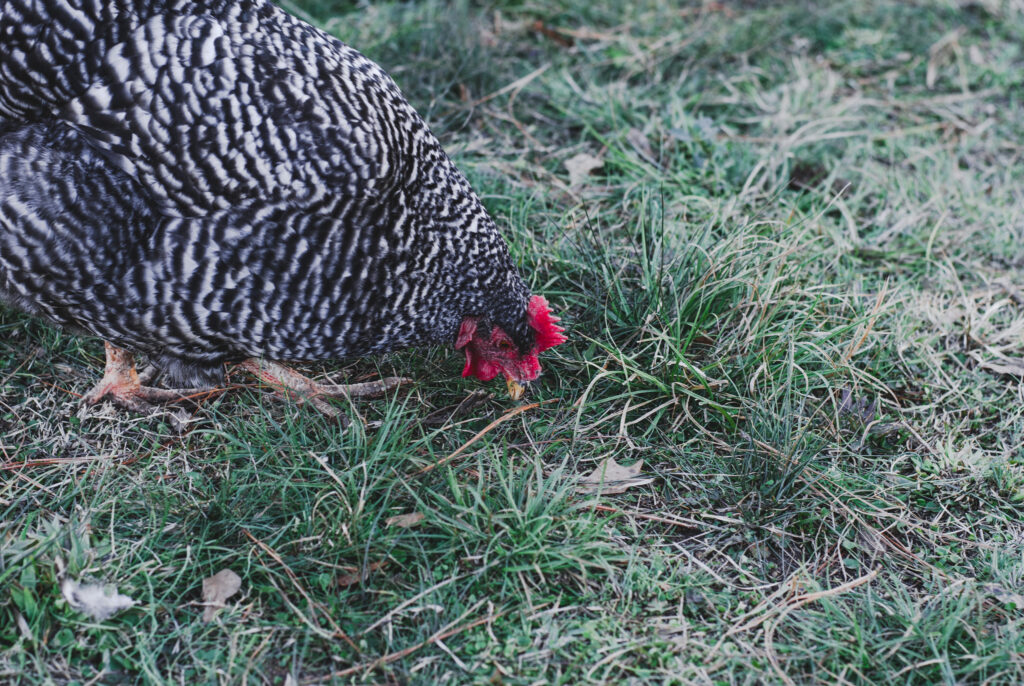
Safety
When it comes to free-ranging chickens, safety is paramount for both your feathered friends and your peace of mind. While giving your chickens the freedom to roam is essential for their well-being, it’s equally important to ensure they stay safe from potential hazards. Here are some key tips to help you free-range your chickens safely:
1. Predators Beware: Predators pose one of the most significant threats to free-range chickens. From foxes and raccoons to hawks and even neighborhood dogs, there’s no shortage of critters looking for a chicken dinner. To keep your flock safe, invest in sturdy fencing that’s buried underground to prevent digging. Livestock guard dogs are a great way to keep your flock protected. If they’re trained properly, they’ll do an exceptional job.
Aerial predators are a big threat to free-range chickens. Some chickens are less prone to predators in the sky than others. Try owning breeds that are alert and dark in color. The majority of chickens I’ve lost to aerial predators have been white or light.
If your zoning allows for it, having a few roosters in your flock will also help protect against predators. A rooster will alert the hens that danger is nearby. They’ll also help to defend them, giving the hen a chance to escape danger.
2. Supervised Outings: While it’s tempting to let your chickens roam freely without a care in the world, keeping a watchful eye on them during their outdoor adventures can help prevent accidents and keep them out of harm’s way. Designate specific times of the day when you can supervise your chickens as they explore the great outdoors, and be mindful of any potential dangers lurking nearby. If you work a full-time job, this may not be possible.
4. Regular Checks and Maintenance: Regular maintenance and inspections of your coop are essential for identifying and addressing potential safety hazards before they escalate. Routinely inspect fencing for signs of wear or damage, secure any loose wires or nails that could pose a threat, and remove any debris or obstacles that could cause injury to your chickens.
Also, feed and water your chickens in the coop. This will help to remind them that this is a safe spot and entice them to roost there at night.
5. Know Your Surroundings: Familiarize yourself with the area where your chickens will be free-ranging, taking note of any potential hazards or risks that could jeopardize their safety. Keep toxic plants out of reach, secure garbage bins to prevent scavenging, and be mindful of any nearby predators.
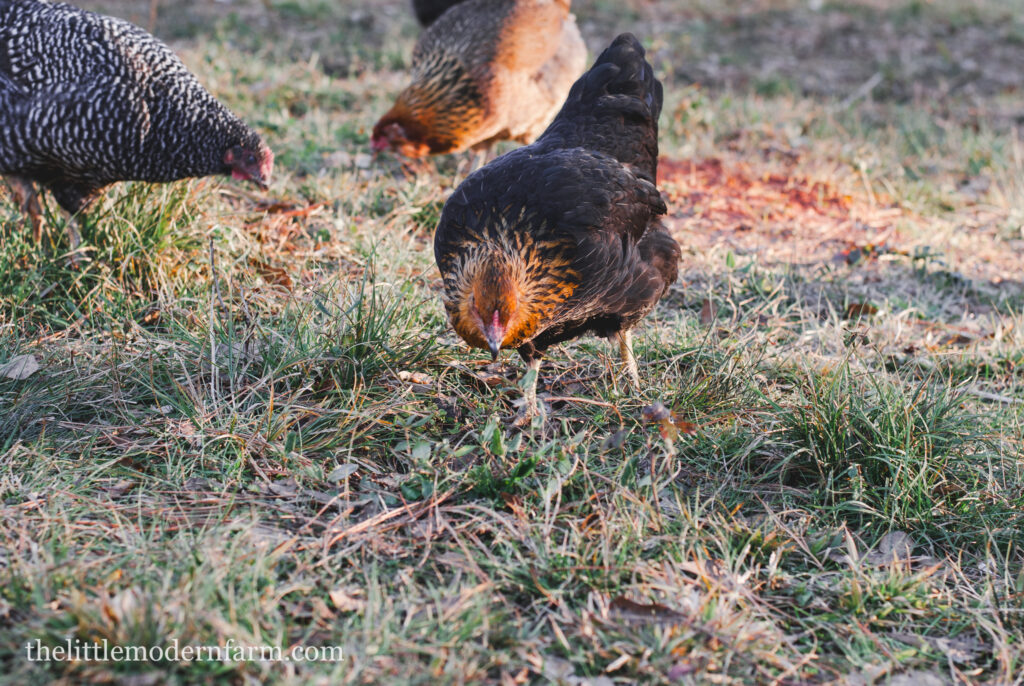
Let’s Explore The Pros and Cons:
Pros of Free-Ranging Chickens:
- Improved Welfare: Free-ranging allows chickens to exhibit natural behaviors like foraging, dust bathing, and exploring their surroundings. This contributes to their overall well-being and mental stimulation. You’ll also have fewer squabbles among flock members when they have plenty of space to roam.
- Healthier Diet: Free-range chickens have access to a more varied diet, including insects, seeds, grass, and vegetation, which can result in eggs with higher nutritional value, including increased levels of omega-3 fatty acids and vitamins.
- Better Quality Eggs: Eggs from free-range chickens often have richer yolks and a more flavorful taste compared to those from caged chickens. Many people prefer the taste and texture of free-range eggs.
- Reduced Stress: The birds experience less stress compared to their confined counterparts, which can positively impact their health and productivity.
- Environmental Benefits: Free-ranging chickens contribute to sustainable agriculture practices by naturally fertilizing the soil, controlling pests, and reducing the need for chemical inputs. I allow my chickens to free-range with my pigs. They greatly reduce the fly population.
Cons of Free-Ranging Chickens:
- Predator Vulnerability: Free-range chickens are more susceptible to predation by predators such as foxes, raccoons, hawks, and neighborhood dogs. Protecting them from predators requires additional measures and vigilance.
- Disease and Parasites: Free-ranging chickens have a higher risk of exposure to diseases and parasites, including avian influenza, coccidiosis, and external parasites like mites and lice. Regular health monitoring and preventive measures are necessary to mitigate these risks.
- Damage to Gardens and Landscapes: Free-range chickens may cause damage to gardens, flower beds, and landscaping by scratching, pecking, and dust bathing. This can be problematic for gardeners and homeowners who value their outdoor spaces. I experience this firsthand in my vegetable garden. They will destroy new plants and produce.
- Legal and Zoning Restrictions: Keeping free-range chickens may be restricted or regulated by local ordinances, homeowners’ associations, or zoning laws. Potential limitations on flock size, noise, and sanitation may impact the feasibility of free-ranging in certain areas.
- Egg Collection Challenges: Free-ranging chickens may lay eggs in hidden or hard-to-reach places outdoors, making egg collection more challenging. You can remedy this by occasionally keeping them locked in their coop for a full day to remind them of where to lie.
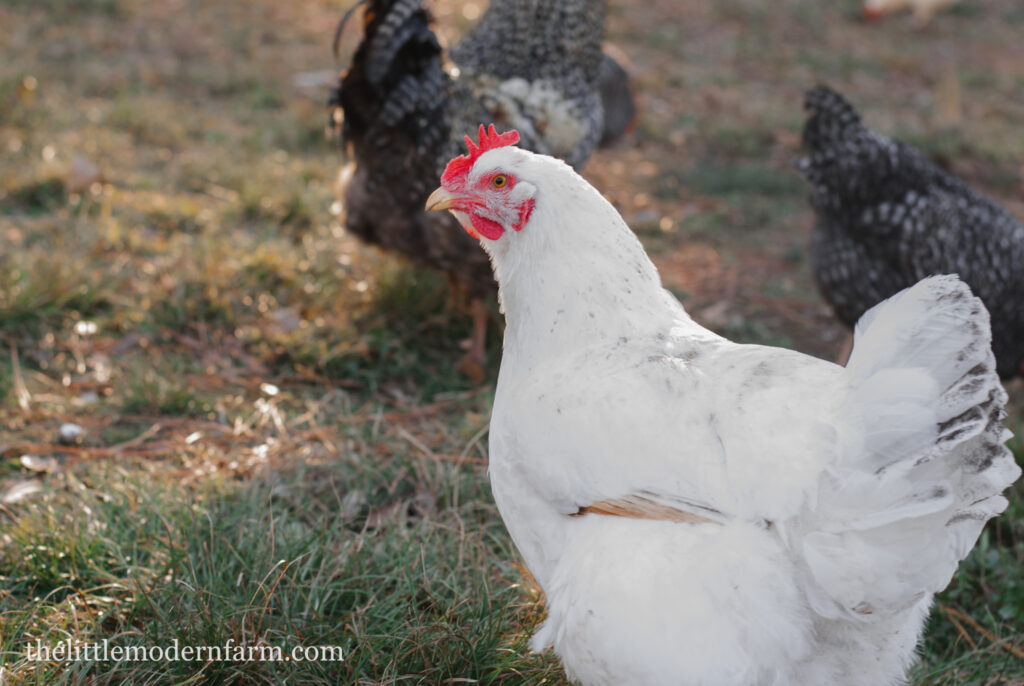
Alternatives to Free Ranging Chickens
Enclosed Runs: Instead of allowing chickens to roam freely, you can provide them with enclosed outdoor runs attached to their coop. These runs offer more space for chickens to move around and engage in natural behaviors while still providing protection from predators and minimizing damage to gardens and landscapes.
Chicken Tractors: Chicken tractors are movable pens or enclosures that allow chickens to graze on fresh grass and forage for insects while remaining contained within a designated area. They can be moved regularly to provide access to fresh forage and prevent overgrazing.
Semi-Free Range: Semi-free-range systems provide chickens with limited access to outdoor areas during certain times of the day or under controlled conditions. This allows chickens to enjoy the benefits of outdoor ranging while reducing risks associated with predation, disease, and environmental damage.
Backyard Coops: Backyard coops offer a safe and secure environment for chickens to live and lay eggs while still allowing them some outdoor access within a fenced yard or enclosed area. This option is ideal for urban and suburban settings where space may be limited.
Integrated Livestock Systems: Integrated livestock systems involve keeping chickens in combination with other animals such as goats, sheep, or pigs. Chickens can forage for insects and help control pests while benefiting from the presence of other livestock species. My free-range flock shares pasture space with the pigs. Check out m post on raising pigs and chickens together.
Each of these alternatives offers its own set of advantages and considerations, allowing poultry keepers to choose the option that best suits their needs, available space, and management preferences.
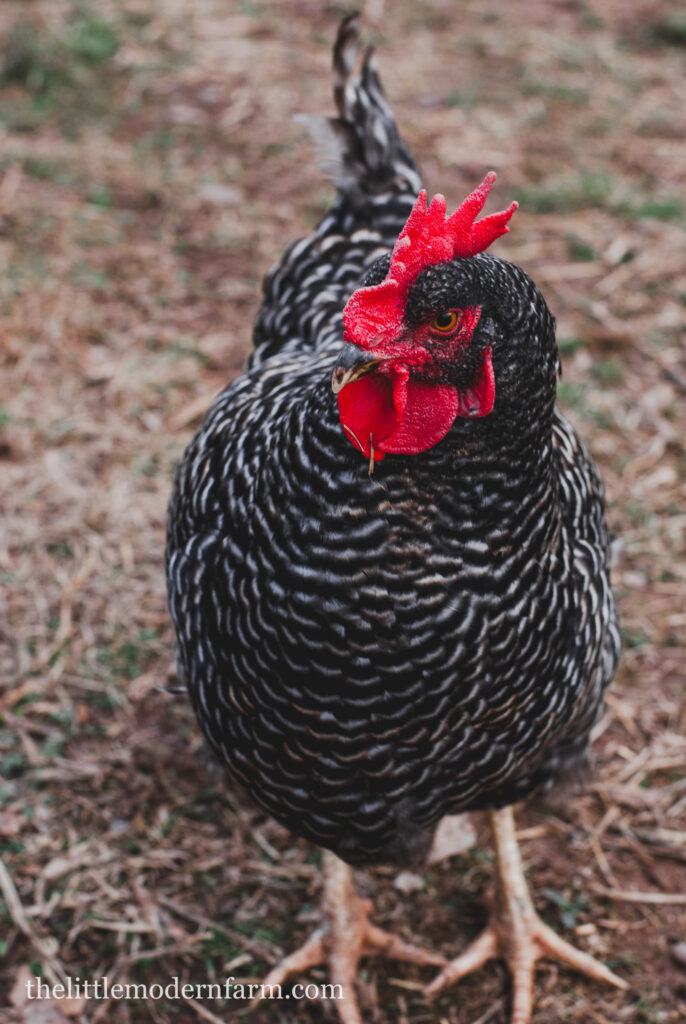
FAQS
What does “free-range” mean when it comes to chickens?
“Free-range” refers to a farming method where chickens are allowed to roam freely outdoors, with access to natural sunlight, fresh air, and vegetation. Unlike conventional farming methods where chickens are confined to cages or indoor facilities, free-range chickens have the freedom to forage and exhibit natural behaviors.
Are free-range eggs better for you?
Free-range eggs are often considered healthier than eggs from caged chickens because free-range hens have access to a more natural diet and lifestyle. They typically have higher levels of omega-3 fatty acids, vitamin D, and other nutrients compared to eggs from caged chickens.
How much space do free-range chickens need?
Free-range chickens should ideally have at least 10 square feet of outdoor space per bird to roam and forage comfortably. However, the more space they have, the happier and healthier they will be.
Do free-range chickens need a coop?
Yes, free-range chickens still need a secure coop for shelter, nesting, and protection from predators, especially at night. The coop serves as a haven where chickens can roost and lay eggs.
Are there regulations for labeling eggs and poultry as “free-range”?
Yes, many countries have regulations and standards for labeling eggs and poultry as “free-range.” These regulations typically specify criteria such as minimum outdoor space requirements, access to pasture, and duration of outdoor access for chickens.
Do free-range chickens need supplemental feed?
While free-range chickens can forage for insects, seeds, and vegetation outdoors, they may still require supplemental feed to ensure a balanced diet. Providing high-quality chicken feed enriched with vitamins and minerals can help meet their nutritional needs.
How do you protect free-range chickens from predators?
Protecting free-range chickens from predators requires measures such as secure fencing, predator-proof coop designs, and deterrents like motion-activated lights or alarms. Regular supervision and awareness of local predators are also important for keeping chickens safe.
Can free-range chickens be kept in urban areas?
Yes, free-range chickens can be kept in urban areas, but it’s essential to check local zoning regulations and ordinances regarding keeping poultry. Providing adequate space, addressing noise concerns, and ensuring proper waste management are important considerations for urban chicken keeping.
Do free-range chickens lay more eggs than caged chickens?
The egg production of free-range chickens can vary depending on factors such as breed, age, diet, and environmental conditions. Although free-range hens may have more natural behaviors and have access to a more varied diet, egg production rates can vary among individual chickens.
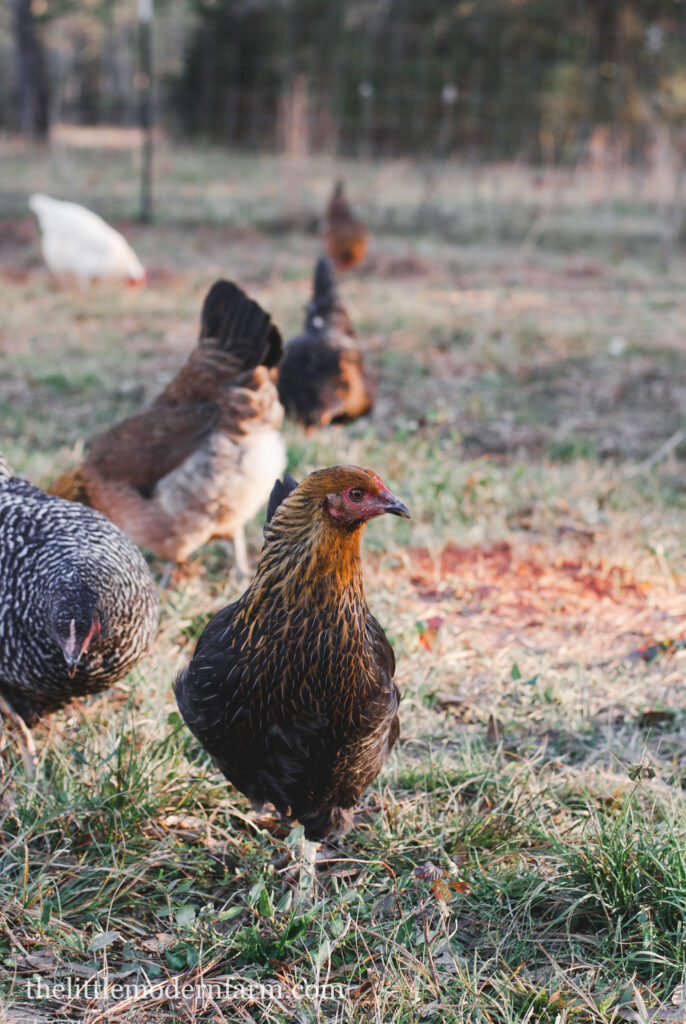
Final Thoughts
In conclusion, free-ranging chickens offer a host of benefits that extend beyond just fresh eggs and wholesome poultry. They embody a holistic approach to farming that values the health and happiness of animals, the sustainability of our food systems, and the preservation of our natural environment. By choosing to free-range your chickens, you’re not just raising livestock—you’re fostering a way of life that celebrates the beauty and abundance of the natural world.
If you enjoyed this post, please share it! Thanks for visiting my farm.
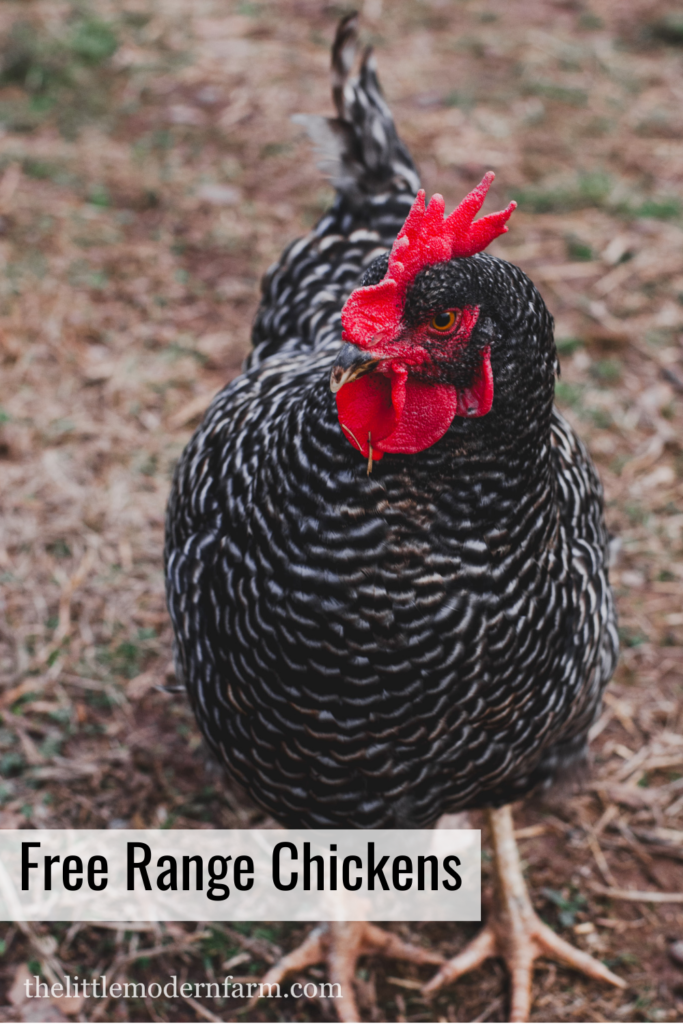
[…] Free Range Chickens […]